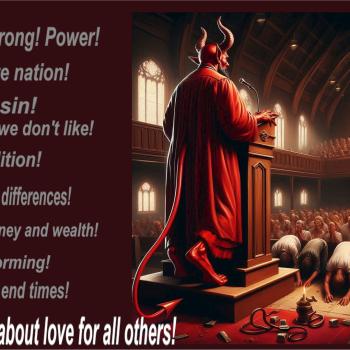Sometimes the simple lessons are the best ones. There are lessons so simple they're easy to miss, especially when all our thoughts are overlaid with the tendentious social or political assumptions of our day. I have a treasured list of "simple lessons" from the Bible, and will give a couple of examples to illustrate what I am talking about.
Consider the passage in Mark 1:29-31, when Jesus goes with some of the disciples to the house of Simon (Peter) and Andrew (all citations NIV):
As soon as they left the synagogue, they went with James and John to the home of Simon and Andrew. Simon's mother-in-law was in bed with a fever, and they immediately told Jesus about her. So he went to her, took her hand and helped her up. The fever left her and she began to wait on them.
I have never known a Bible teacher to address this passage without laughing sheepishly, and making an obligatory reference to the difference in our modern social perspective on the position of women in the household. And it's natural to think in those terms. But there is a simple and profound lesson in this little event, one that we see if we look at it through different eyes. When Jesus heals us, we are able to begin serving others. What if we saw the mother-in-law as being liberated to give good gifts, with a song in her heart, rather than restored to service like a kitchen appliance?
Another example may be found in John 6:16-21, when the disciples set out in a boat to cross the lake, after Jesus has fed and taught the 5,000:
When evening came, his disciples went down to the lake, where they got into a boat and set off across the lake for Capernaum. By now it was dark, and Jesus had not yet joined them. A strong wind was blowing and the waters grew rough. When they had rowed about three or four miles, they saw Jesus approaching the boat, walking on the water; and they were frightened. But he said to them, "It is I; don't be afraid." Then they were willing to take him into the boat, and immediately the boat reached the shore where they were heading.
I have read and discussed that passage many times over the years, and the ideas of study groups always revolve around the disciples' fears in the storm. But one day when I was in the Navy, we read the story in a women officers' Bible study. One of my sister officers laughed, and said, "Look at that! When you let Jesus into your boat, you immediately reach the shore where you were heading." Our leader smiled, struck by this insight, and said: "Wow. 'It is finished.' [John 19:30] This puts that in a new light, doesn't it? No more rowing in the storm for us, once Jesus gets into our boat. Just 'I will give you rest' [Matthew 11:28]."
One thing the "simple lessons" have in common is that to perceive them, we have to take our eyes off the bad things: the storms, inequalities, resentments, suspicions, imperfections, and fears that constitute our prism for viewing life. Another way to put it is that we have to let go of these things. We have to stop behaving as if focusing on them obsessively is a means of getting them under our control. The truth is that the more of our time, spirit, and intelligence we devote to them, the more they rule us. We can never master them; we can only give up spending our time and mental resources on them.
I mention these thoughts about simple lessons because all of the factors above have come together in a drama playing out right now in America's national life: the race for the Republican presidential nomination. The situation involves focusing on the bad things, and it has a surreal air of spiraling out of control, as if the onslaught of derogatory allegations and innuendo about the candidates will never stop. To anyone with common sense, it seems both distasteful and suspicious: it can't reasonably be the case that everyone who wants to run for president is a sleazy buffoon waiting to be exposed.
Commentators labor to debunk the allegations, explain the unfairness of the media coverage, and make the case that we need to give the candidates the benefit of the doubt. Other pundits argue that if a candidate finds himself stymied by innuendo, unsubstantiated claims, and deliberate misrepresentations by the media, he doesn't have what it takes to be president anyway. One candidate after another falls from grace in the polls, as supporters and discouraged voters watch with a sense of helplessness.
There is undoubtedly more than one lesson to be drawn from a dramatic, outsize problem like this. But one clear lesson is that this is what we get when we deem ourselves competent to use our own, human rules for thinking about our communal life and judging potential leaders. When we write our own rules, there is no escape from cheap condemnation. We can't make it stop, and we can't out-argue insinuation and slander.





